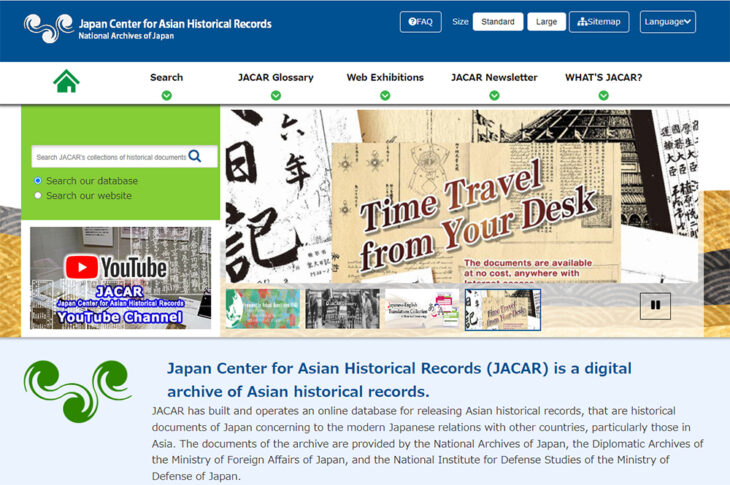Post-COVID Japanese Studies: Digital Materials, Analog Dialogue

Screenshot of the Japan Center for Asian Historical Records (JACAR) website, which was redesigned in 2021 with expanded public materials and affiliated archives.
Source: https://www.jacar.go.jp/english/index.html
Shimizu Yuichiro, Professor, Faculty of Policy Management, Keio University

Prof. Shimizu Yuichiro
We have finally emerged from a very long tunnel. For effectively three years, people’s mobility between Japan and the rest of the world was severely restricted. The fact that goods and information suffered few disruptions is fortunate, but the field of research exchanges, which places an importance on building in-person relationships, was forced into stagnation.
Of course, it was not a complete blackout. Various international conferences were held in online formats thanks to the dedicated efforts of those involved. But while those approaches maintained existing connections, they made it difficult to forge new ones for the future. We were reminded of the complex perceptions that face-to-face interactions produce, and of how having extra time during these interactions is important in the way it expands possibilities.
The desire for connections seems to have increased significantly over the past three years. In the summer of 2021, at the doctoral student workshop of the European Association of Japanese Studies (EAJS) that was held online, there was an outflow of opinions exchanged between students and recommendations of related texts over the webinar chat during research presentations. These interactions gave a glimpse of the future possibilities of Japanese studies that differ from the comments made by advisory staff. Similar activities were being carried out for young Japanese studies researchers in Central and Eastern Europe.
If researchers are eager to connect, let’s facilitate their connections. Enthusiastic developments such as these were also on display. This after all was the point behind the Collaborative Research Workshop for Aspiring Scholars in Japanese Studies that the Japan Foundation has been running since 2018, and it shifted to an online format from 2020 due to the COVID-19 pandemic. This transition to online also came at just the right time, as it reinvigorated perspectives by cutting across different research themes in addition to countries and regions. There are also signs that these connections are also developing into reports that will be made at international conferences. In 2022, when travel options became more flexible, young scholars continued to take advantage of those benefits, finding research areas of mutual interest online in the early stages of activities, and then visiting Japan for in-person exchanges and summarizing their findings in presentations during the latter stages.
I have taken part in all of the above activities, where I emphasized the importance of relying on people, and being relied upon. That means instead of suffering alone, seeking help for what you cannot do, helping one another, and sharing in the joy. That’s because under the inconveniences of the COVID-19 pandemic, I was able to confirm that that reciprocity is the power that drives exchanges.
Inconveniences lead to many realizations and developments. Before the pandemic, scholars of Japanese studies based overseas frequently expressed their frustration with the slow progress in the digitization of papers written in Japanese and other Japanese materials. Japanese researchers who had easy access to these resources did not fully comprehend the difficulties faced by their colleagues abroad, and so we were lazy about improving the situation. The more historic the academic societies, the more they were dominated by conservative leading scholars who were uneasy about digitization and thought that academic journals should remain in printed form, preventing improvements. This led to a growing impression of “closed Japanese studies” leading to growing frustration among Japanese researchers abroad.
The pandemic forced Japanese researchers to experience the inconvenience inherent in this analogism for themselves. The more “conservative” the leading scholars, the more likely they were to avoid going out in fear of getting infected, and the need to rely on digital technologies emerged. This was a golden opportunity for reformers.
Consequently, the situation has greatly improved. Here I would like to introduce some of the progress that was made in digitization over the pandemic. It was the academic journals that were the most reluctant to digitize. In addition to the wishes of influential figures, the relationships with the publishers that had been responsible for the publication work also slowed down digitization.
Today, many academic journals can be downloaded from J-STAGE, which is operated by the Japan Science and Technology Agency (JST). Key publications in the field of Japanese history such as Shigaku-Zasshi (Journal of the Historical Society of Japan), Nihonshi kenkyu (Journal of Japanese History), Rekishi to keizai (The Journal of Political Economy and Economic History), and in political science including Nenpo seijigaku (The Annuals of Japanese Political Science Association), Nenpo gyosei kenkyu (The Annuals of the Japanese Society for Public Administration), Senkyo kenkyu (Japanese Journal of Electoral Studies) and Kokusai seiji (International Relations) can be obtained in PDF format up to a few years after their printed publication. University bulletins can also be downloaded from the repository almost simultaneously with the publications of their printed editions. This means that the latest research findings and trends in Japan can be read about around the world without significant delays.
The Japan Center for Asian Historical Records, National Archives of Japan (JACAR) has long provided a wealth of materials in digital form around the world, policies that have been well received. To mark its 20th anniversary, the Center redesigned its website in 2021, making further improvements to convenience with the expansion of public materials and affiliated archives.
A significant change related to documentary records has been made. In 2016, the National Diet Library (NDL) integrated its Digital Collections and began to gradually make records whose copyright protection period had expired available for searching and viewing over the Internet. Records and magazines that were still within their copyright protection periods were also being digitized gradually. However, to access them, we had to physically visit the NDL or a participating library in its transmission service.
Starting March 2022, the scope of transmission was extended to individuals registered with the NDL. This made it possible for researchers to easily view journal materials and other documents from their homes. From January 2023, a printing feature was added to the transmission service, and this of course made it possible to save the printouts as PDF files. Currently, this service is limited to registered users living in Japan, but I suspect it will significantly streamline the document research process for Japanese studies researchers visiting Japan from overseas.
Lastly I would like to talk about Next Digital Library, which will innovate the role of material collection. The library enables the full-text searching of more than 360,000 digital materials, allowing researchers to exhaustively research how certain words were used in the past. In addition to word-based search, images can also be searched. It is currently implemented as a trial service, but the materials it covers are being gradually expanded, and many researchers including myself have begun to make use of it.
NDL Lab, which has developed this service, has continued to take on other ambitious challenges, including the operation of NDL Ngram Viewer, which displays the frequency with which words or phrases appear by year of publication based on text data from 2.3 million books, and JAPAN SEARCH, which enables exhaustive searches of digital archives in Japan.
In response to the advance of digitalization, researchers of Japanese studies around the world will continue to evolve. A future where Japanese studies in Japan and abroad forge deeper links and continue to develop has come into view. This year the Association of Asian Studies (AAS) and EAJS will be holding in-person events. I have also heard that the East Asian Consortium of Japanese Students (EACJS) is heading in that direction. I look forward to developing future connections with scholars of Japanese studies around the world through a mixture of remote and in-person interactions.
Translated from an original article in Japanese written for Discuss Japan. [March 2023]
Keywords
- Shimizu Yuichiro
- Faculty of Policy Management
- Keio University
- COVID
- international conference
- research
- online
- analog
- face-to-face
- in-person interactions
- connections
- reciprocity
- digitization
- academic journals
- Japanese studies
- J-STAGE
- Japan Science and Technology Agency
- JACAR
- Japan Center for Asian Historical Records
- National Archives of Japan
- NDL
- National Diet Library
- Digital Collections
- Next Digital Library




